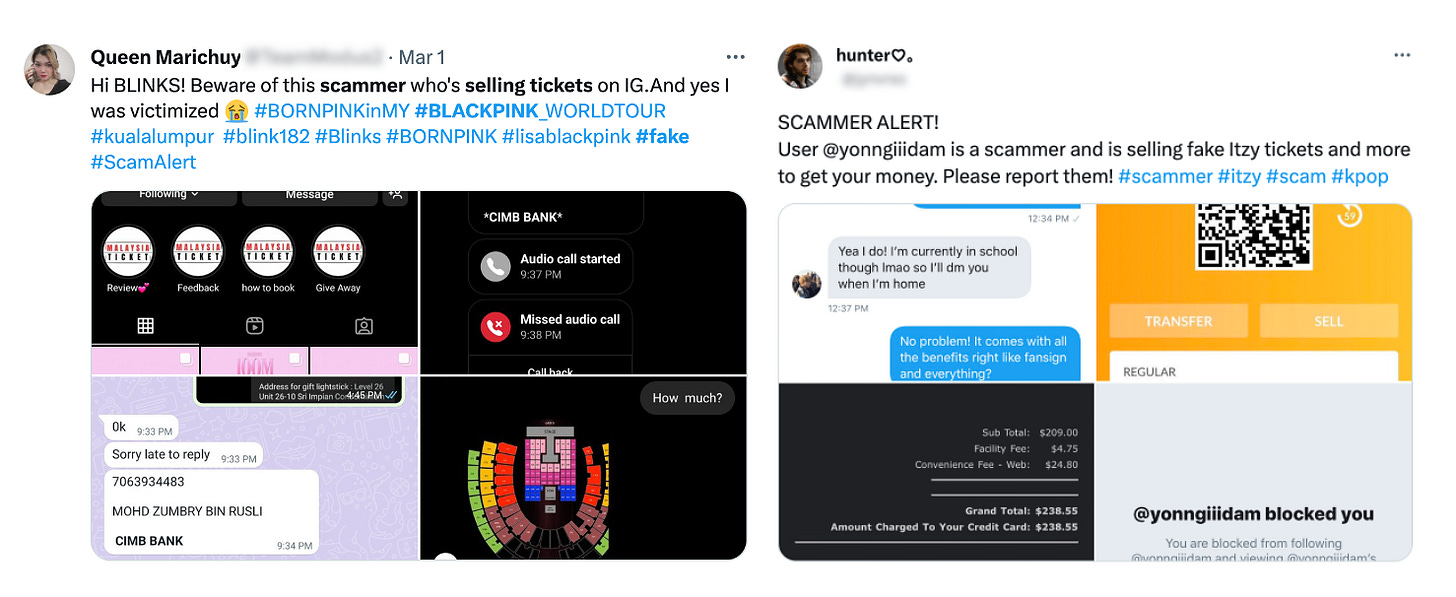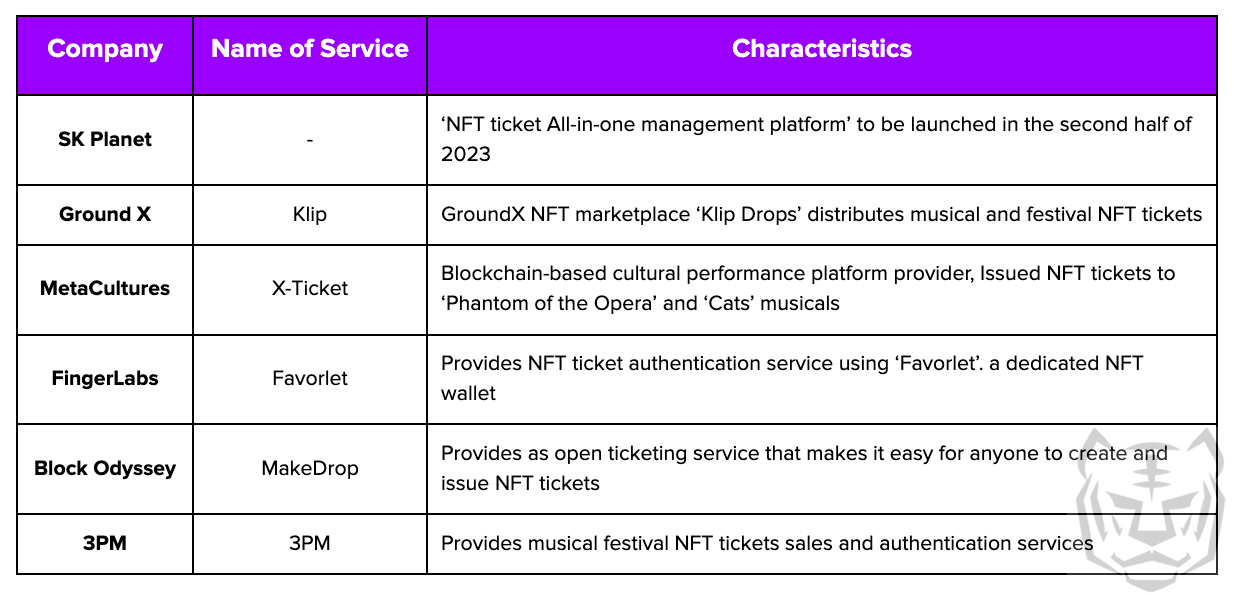TL;DR
The Korean live performance industry is showing explosive growth, driven by K-PoP fever. It has already recovered to pre-COVID levels and shows no signs of stopping.
There has also been a corresponding surge in ticket fraud cases, mainly due to counterfeits. This is the problem NFT technology aims to solve.
The concert industry in particular has a complex structure, and there are many obstacles to consider such as: 1) understanding the existing ticket distribution system, 2) a complex and rigorous ticket screening process, and 3) potential backlash from the existing fandom base.
The Korean concert industry is undergoing a Renaissance
The live performance industry in Korea is experiencing rapid growth and has already bounced back to the levels seen before COVID, with no indications of slowing down. Interpark, the country's No. 1 ticket distributor, reported $511.6 million in concert ticket sales in 2022, a record high. This can be attributed to a sharp increase in pent-up demand for performances following the pandemic transition, and the growth momentum has been further fueled by the global spread of K-pop culture.
NFT tickets to the rescue
Unfortunately, the number of fraud cases is also increasing, mainly from the purchase of counterfeit tickets. This is due to ticket scalping, which prevents many actual consumers from acquiring tickets. In the first half of 2023 alone, there were about 7,500 cases of ticketing fraud in Korea, with estimated damages reaching up to $2.53 million.
As the size of the live performance market grows, the problems with ticket-related damages is also becoming more prominent. Various preventive measures are being considered to solve this issue. Recently, NFT technology has stepped up to the plate. Several Web3 project teams are working to solve the problems of ticket scalping and counterfeit ticketing by utilizing NFT technology.
A fragmented landscape
NFT tickets are considered to be the one of the potential application of NFT technology that will bring about 'mass adoption' while solving the problems of the existing ticket market. This is because of the following reasons.
The non-substitutable nature of NFTs is similar to that of tickets. Thus, the hurdle for technical application is expected to be low.
The rationale for applying NFT technology is relatively clear, so users are more likely to welcome it.
In particular, the characteristics of blockchain transparency make it a great countermeasure to problems like ticket scalping and counterfeit ticket transactions. As can be seen below, many companies are already focusing on the combination of concert tickets and NFT technology.
However, these cases seem to be more of a test run than a full-fledged business for the following reasons.
Only a small portion of the total tickets issued were issued as NFT tickets.
They were more focused on providing additional benefits such as discounts and merchandise rather than serving as a standalone replacement of the original tickets.
The NFT ticket sector is still in its early stages, and more companies are expected to enter the nascent market.
Characteristics of the Korean NFT ticket industry
The live performance ticket industry has a market with clear problems that can be addressed by utilizing blockchain technology, with many companies eager to enter it. However, it is a fairly complex ecosystem with many factors to consider ranging from the issuance and distribution to the actual use of concert tickets.
First, understanding the existing ticket distribution system is crucial. NFT tickets are not a standalone business. Partnerships with the key players such as the 1/performance organizers and 2/ticket distributors are essential. Simply securing the IP required for a performance through a performance agency may not be enough. Many performance agencies also maintain a close partnership with ticket distributors, so fostering a cooperative relationship with distributors will also be helpful in the long run. In fact, many ticket distributors sign or require exclusive contracts with the performance organizers.
The second is a complex and rigorous ticket verification process. In concerts where demand far outstrips supply, there is a complex verification procedure that involves various forms of identification (ID, passport, etc.). There are also cases where people are unable to purchase the tickets directly, such as in the case of minors or the elderly. In this case, other family members purchase tickets for them instead, which then requires submitting proof of family relationship. Furthermore, if the ticket is for fan club members, the club membership must also be verified at the venue. Due to these various exceptions, it may be difficult to respond flexibly with NFT tickets alone.
Finally, there's potential backlash from the existing fan base. This is especially a major concern in the K-pop market, where a strong fan base is the backbone of any artist group. It is important to recognize that the fandom has an inherently negative perception or no understanding of NFT technology. For example, Korean entertainment company Hive announced plans to create and sell BTS images as NFTs. The agency was consequently criticized for trying to use carbon-intensive NFT technology as a quick money making scheme.
Entry strategy for the Korean NFT ticket business
As such, the concert ticket industry is quite tricky to navigate as it involves many stakeholders such as 1) concert organizers, 2) ticket distributors, and 3) the fandom community (audiences). Therefore, it will be difficult to introduce NFT technology without addressing the following issues beforehand.
Formulate a win-win strategy that can attract performance organizers and ticket distributors, the mainstays of the existing ticket distribution ecosystem.
Good presentation of the practical utility for NFT tickets will be required. For example, your NFT ticket product should be useful enough to create additional value that conventional tickets cannot gain or should be able create a faster and more flexible ticketing process that reduces both time and cost.
In addition, the live performance industry consists of various types of concerts, including musicals, sports, theater, and classical music. Flexible business strategies will be required in order to accommodate each type. For example, K-pop concerts require strict screening processes. In comparison, relatively lenient processes may be applied to other types of performances where supply and demand are better balanced.
Conclusion
The Korean NFT ticket market is expected to grow further in the future, for the following reasons.
The demand for performances will continue to increase in line with the global popularity of K-pop, which in turn will contribute to NFT ticket business growth.
NFTization of performance tickets is expected to accelerate as ticket sales using macro programs are prohibited under the amendment of the Public Performance Act.
Korean IT giants such as Naver and Musinsa are entering the ticket resale transaction market. They are expected to actively utilize blockchain technology for processing secondary sales.
The NFT ticket market is full of growth potential in Korea. Active competition is expected to ensue as companies try to establish themselves as the market leader.







